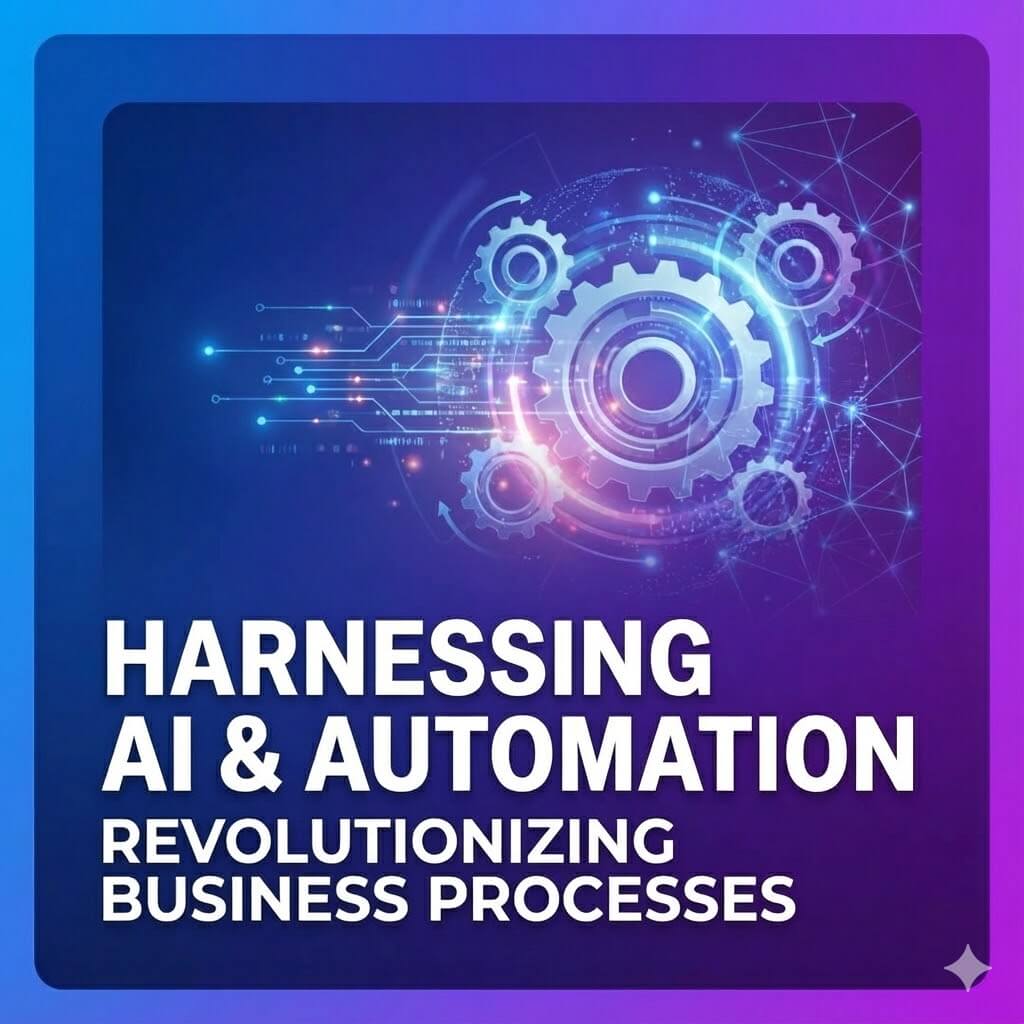
Harnessing AI and Automation: Revolutionizing Business Process Automation
In today's fast-paced business landscape, the integration of artificial intelligence (AI) and automation is transforming the way companies operate. This article explores how leveraging AI can streamline business processes, enhance efficiency, and drive growth. Discover the immense potential of AI in business process automation and why it's essential for modern enterprises to embrace these technologies.
Outline
- What is AI and Business Process Automation?
- How Can AI Transform Business Operations?
- What Are the Key Benefits of AI in Business Automation?
- How to Implement AI in Business Processes?
- What Are the Use Cases of AI in Business Process Automation?
- AI Tools and Technologies for Business Automation
- Challenges in AI and Business Process Automation
- Future of AI in Business Process Automation
- How AI is Revolutionizing Specific Industries
- Case Studies: Success Stories of AI in Business Process Automation
What is AI and Business Process Automation?
Artificial intelligence (AI) and business process automation (BPA) are distinct yet complementary technologies that are reshaping the business world. AI involves the use of sophisticated AI algorithms and machine learning to perform tasks that typically require human intelligence, such as data analysis, decision-making, and pattern recognition. Business process automation, on the other hand, focuses on automating repetitive tasks and streamlining workflows to improve efficiency and reduce manual intervention.
Integrating AI into BPA, known as intelligent process automation, enhances the capabilities of traditional automation by enabling systems to learn, adapt, and make informed decisions. This combination not only accelerates business processes but also minimizes errors, leading to significant improvements in productivity and cost savings.
For a tool that automates businesses through AI check out SalesMind AI.
How Can AI Transform Business Operations?
AI has the potential to revolutionize business operations by automating complex tasks and providing actionable insights. AI systems can analyze vast amounts of data quickly and accurately, helping businesses make data-driven decisions. For example, AI can be used to optimize supply chain management by predicting demand patterns and identifying inefficiencies.
Moreover, AI-powered automation can enhance customer service through conversational AI tools like chatbots, which provide instant support and personalized interactions. By automating routine inquiries and processes, businesses can free up human resources to focus on higher-value tasks, ultimately improving overall business performance.
Watch this video for a different take on AI in Business Automation:
What Are the Key Benefits of AI in Business Automation?
The benefits of AI in business automation are manifold. Firstly, AI can automate repetitive tasks, reducing the time and effort required for manual processes. This leads to increased efficiency and allows employees to concentrate on more strategic activities. Additionally, AI-driven automation enhances accuracy by minimizing human errors, ensuring consistent and reliable outcomes.
Another significant advantage is cost reduction. By automating tasks, businesses can save on labor costs and reduce operational expenses. AI also enables better resource utilization, optimizing workflows and improving productivity. Furthermore, AI provides valuable insights through data analysis, helping businesses identify trends, forecast demand, and make informed decisions.
The use of AI in business automation also offers scalability. As business needs grow, AI-powered automation systems can easily adapt to handle increased workloads without compromising performance. This scalability ensures that businesses can maintain high levels of efficiency and productivity even as they expand.
How to Implement AI in Business Processes?
Implementing AI in business processes requires a strategic approach. Start by identifying areas where AI can add value, such as automating repetitive tasks, improving decision-making, or enhancing customer experiences. Next, assess the existing infrastructure and determine the necessary AI tools and technologies to integrate.
Develop a clear implementation plan, outlining the steps, timelines, and resources needed. It's crucial to involve stakeholders from various departments to ensure alignment and support. Additionally, consider partnering with AI solution providers to leverage their expertise and accelerate the implementation process.
Training and upskilling employees are essential to ensure a smooth transition. Provide training sessions on using AI tools and encourage a culture of continuous learning. Monitor the progress and performance of AI implementations, making adjustments as needed to optimize results.
What Are the Use Cases of AI in Business Process Automation?
AI has numerous use cases in business process automation across different industries. In finance, AI can automate fraud detection by analyzing transaction patterns and identifying anomalies. In healthcare, AI-powered systems can streamline patient scheduling, manage medical records, and assist in diagnostics.
In the retail sector, AI can optimize inventory management, personalize marketing campaigns, and enhance customer service through chatbots. Manufacturing companies can use AI for predictive maintenance, reducing downtime and improving equipment efficiency. Additionally, AI can automate administrative tasks, such as invoice processing and document management, in various business environments.
AI in business automation also extends to HR functions, where AI tools can automate the recruitment process by screening resumes and scheduling interviews, thereby saving significant time and resources. AI can also help in employee training and development by personalizing learning experiences based on individual needs and performance metrics.
Explore an AI tool that could be of use to your business here.
AI Tools and Technologies for Business Automation
Several AI tools and technologies are available to support business automation. Robotic process automation (RPA) is a popular tool that uses software robots to automate repetitive tasks. RPA can be combined with AI to create intelligent automation solutions that handle complex processes and make decisions based on data analysis.
Machine learning algorithms are another key technology, enabling systems to learn from data and improve over time. Natural language processing (NLP) allows AI systems to understand and process human language, making it possible to automate customer service interactions and sentiment analysis.
Generative AI, a subset of machine learning, is being used to create content, designs, and even code, offering new ways to innovate and streamline business processes. AI-powered analytics platforms provide valuable insights by processing large datasets and identifying trends. These platforms can help businesses optimize operations, forecast demand, and make data-driven decisions. Integrating AI technologies into existing systems can enhance their capabilities and drive business growth.
Challenges in AI and Business Process Automation
Challenges and Solutions in Integrating AI into Business Processes
Integrating AI into business processes can present various challenges. Below is a table listing common challenges and suggested solutions to help businesses navigate the integration of AI effectively.
These challenges can be addressed with strategic planning and the right approach, ensuring a smooth and successful AI integration that can significantly improve business operations.
Future of AI in Business Process Automation
The future of AI in business process automation is promising, with continuous advancements in technology driving innovation. AI is expected to become more sophisticated, enabling businesses to automate increasingly complex tasks and make smarter decisions. The integration of AI with other emerging technologies, such as the Internet of Things (IoT) and blockchain, will further enhance its capabilities.
AI will play a crucial role in creating more personalized customer experiences, optimizing supply chains, and improving operational efficiency. As AI technologies become more accessible, businesses of all sizes will be able to harness their potential to drive growth and stay competitive in the market.
Moreover, ethical AI practices will gain importance, ensuring that AI implementations are fair, transparent, and aligned with societal values. The future of AI in business process automation holds immense potential, promising transformative changes across various industries.
How AI is Revolutionizing Specific Industries
AI is revolutionizing specific industries by enhancing efficiency, improving decision-making, and creating new opportunities. In the healthcare sector, AI-driven diagnostics and treatment recommendations are improving patient outcomes. AI-powered robotic surgery and virtual health assistants are also transforming medical practices.
In the financial industry, AI algorithms are streamlining risk assessment, fraud detection, and investment strategies. AI-powered chatbots and virtual assistants are enhancing customer service and providing personalized financial advice.
The retail sector is leveraging AI for demand forecasting, inventory management, and personalized marketing. AI-driven recommendation engines are enhancing customer experiences, increasing sales, and fostering customer loyalty.
Manufacturing industries are using AI for predictive maintenance, quality control, and process optimization. AI-powered robots and automation systems are improving production efficiency and reducing operational costs.
Case Studies: Success Stories of AI in Business Process Automation
Numerous companies have successfully implemented AI in their business processes, achieving significant improvements in efficiency and performance. For example, a leading e-commerce company used AI-powered chatbots to handle customer inquiries, reducing response times and improving customer satisfaction.
A financial services firm implemented AI-driven fraud detection systems, identifying fraudulent activities in real-time and preventing financial losses. In the healthcare sector, a hospital used AI to optimize patient scheduling, reducing wait times and improving resource utilization.
A manufacturing company leveraged AI for predictive maintenance, reducing equipment downtime and saving costs. These success stories demonstrate the transformative impact of AI in business process automation, highlighting the potential for businesses to achieve remarkable results through intelligent automation.
Key Takeaways
- AI and business process automation are revolutionizing business operations by automating repetitive tasks and enhancing decision-making.
- Integrating AI into business processes can significantly improve efficiency, reduce costs, and provide valuable insights.
- Implementing AI requires a strategic approach, including identifying areas of value, assessing infrastructure, and involving stakeholders.
- AI has numerous use cases across different industries, including finance, healthcare, retail, and manufacturing.
- Despite challenges, such as data security and resistance to change, the future of AI in business process automation is promising.
- Success stories from various companies highlight the transformative potential of AI in business process automation.
By embracing AI and automation, businesses can streamline operations, enhance productivity, and stay competitive in today's rapidly evolving business landscape. Get started with your own journey today for free with SalesMind AI.


.avif)


